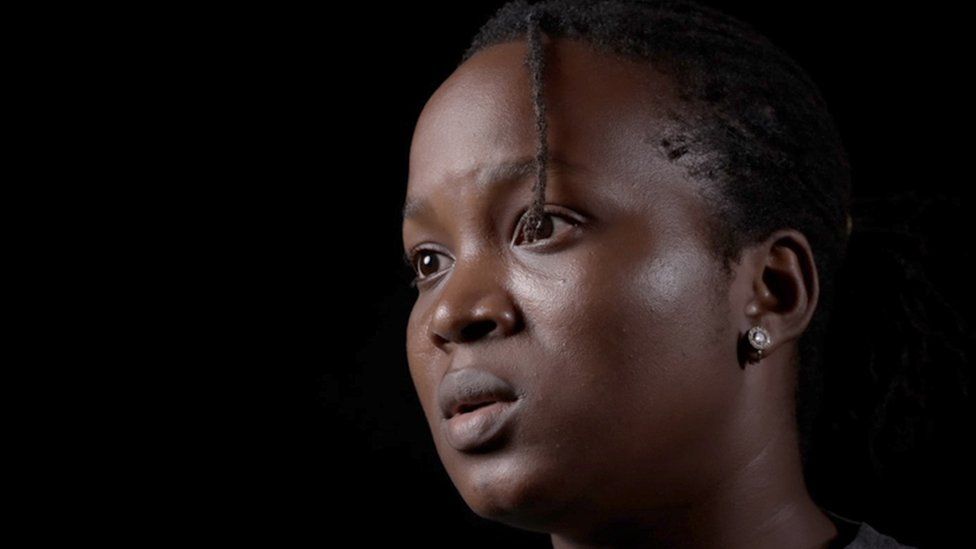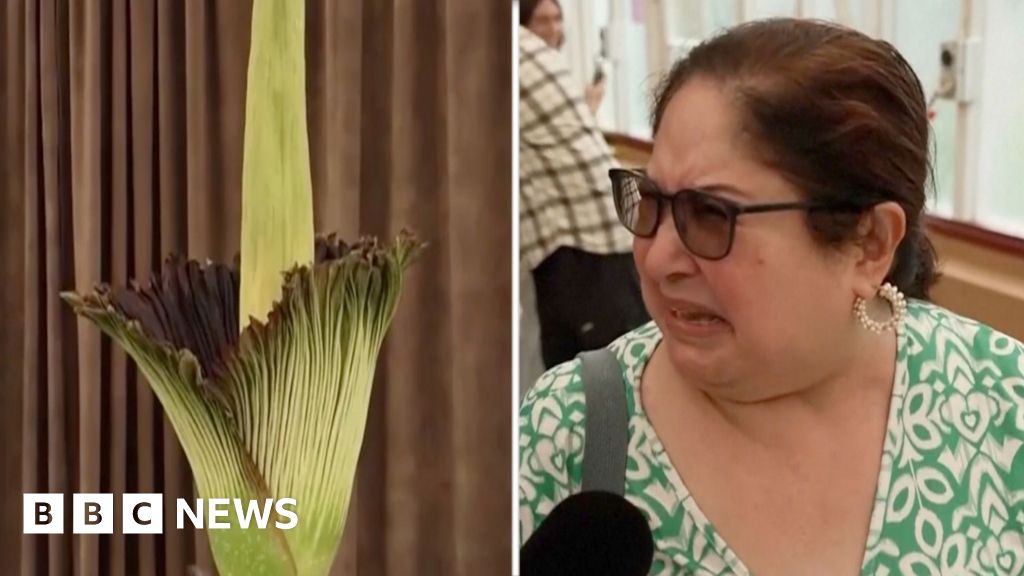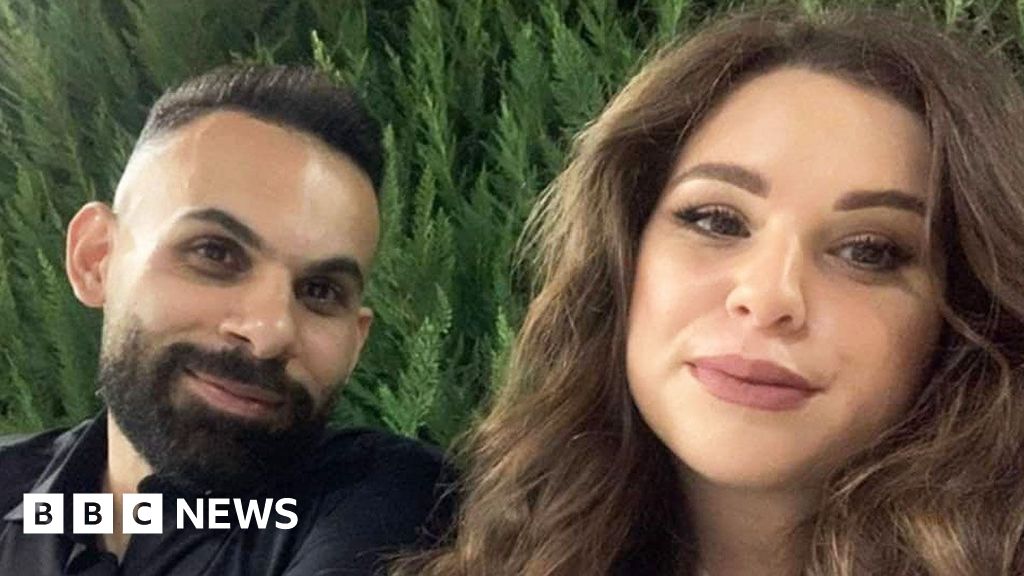ARTICLE AD BOX

By Charlie Northcott, Helen Spooner & Tamasin Ford
BBC Africa Eye
The BBC reveals how the late megachurch leader TB Joshua, who is accused of committing sexual crimes on a mass scale, locked up his own daughter and tortured her for years before leaving her homeless on the streets of Lagos, Nigeria.
Warning: Contains details some readers may find distressing
"My dad had fear, constant fear. He was very afraid that someone would speak up," says one of the pastor's daughters, Ajoke - the first whistle-blower to reach out to the BBC about the abuse she witnessed at her father's church, the Synagogue Church of All Nations (Scoan).
Now aged 27, Ajoke lives in hiding and has dropped her surname "Joshua" - the BBC is not publishing her new name.
Little is known about Ajoke's birth mother, who was believed to be one of TB Joshua's congregants. Ajoke says she was raised by Evelyn, Joshua's widow, from as early as she can remember.
Until the age of seven, Ajoke says she had a very happy childhood, going on holiday with the Joshua family to places like Dubai.
But one day everything changed. She was suspended from school for a misdemeanour, and a local journalist wrote an article referring to her as the illegitimate child of TB Joshua. She was pulled out of school and taken to the Scoan compound in Lagos.
"I was made to move to the disciples' room. I didn't volunteer to be a disciple. I was made to join," she says.
The disciples were an elite group of dedicated followers who served TB Joshua and lived with him inside the maze-like structure of the church. They came from all over the world, many staying at the compound for decades.
They lived under a strict set of rules: forbidden to sleep for more than a few hours at a time, prohibited from using their own phones or having access to their personal emails, and forced to call TB Joshua "Daddy".
"The disciples were both brainwashed and enablers. Everybody was just acting based on command - like zombies. Nobody was questioning anything," she says.
Just a child, Ajoke would not follow the rules like the other disciples: she refused to stand up when the pastor came into the room and rebelled against the severe sleeping orders.
The abuse started soon after.
Not long after arriving, aged seven, she remembers being beaten for wetting the bed and then being forced to walk around the compound with a sign around her neck saying "I am a bedwetter."
"The message about Ajoke was that she had terrible evil spirits that needed to be driven out," says one former female disciple.
"There was a time in the disciple meetings - he [Joshua] said people could beat her. Anyone in the female dormitory could just hit her and I remember just seeing people slapping her as they walked past," she says.
From the moment Ajoke moved to the church in the Ikotun neighbourhood of Lagos, she was treated like an outcast.
"She was, like, kind of labelled the black sheep of the family," says Rae, from the UK, who spent 12 years living in the church as a disciple. Like most of the former disciples interviewed by the BBC, she opted to only use her first name.
Rae remembers a time when Ajoke slept for too long, and Joshua shouted at her to get up.
Image source, AFP
Image caption,Ajoke says after years of abuse she lost her fear of her father aged 17
Another disciple took her to the shower and "whipped her with an electrical cord and then turned the hot water on", she says.
Recalling the incident, Ajoke says: "I was screaming at the top of my voice, and they just let the water run on my head for a very long time."
Such abuse was never-ending, she says.
"We're talking about years and years of abuse. Consistent abuse. My existence as a child from another mother undermined everything he [TB Joshua] claimed to stand for."
The abuse escalated to a different scale when she was aged 17 and confronted her dad about "accounts, first hand, of people who had experienced sexual abuse".
"I saw female disciples go up to his room. They were going away for hours. I was hearing things: 'Oh this happened to me. He tried sleeping with me.' Too many people were saying the same thing," she says.
The BBC spoke to more than 25 former disciples - from the UK, Nigeria, US, South Africa, Ghana, Namibia and Germany - who gave powerful corroborating testimony of experiencing or witnessing sexual abuse.
"I couldn't take it any more. I walked directly into his office on that very day. I shouted at the top of my voice: 'Why are you doing this? Why are you hurting all these women?'
"I had lost every iota of fear for this man. He tried to stare me down, but I was looking in his eyes," she says.
Emmanuel, who was part of the church for 21 years and spent more than a decade living in the compound as a disciple, remembers that day clearly.
"He [TB Joshua] was the first person that started hitting her… then other people joined," he says.
"He was saying: 'Can you imagine what she's saying about me?' Even as much as they were hitting her, beating her, she was still saying the same thing."
Disciples: The Cult of TB Joshua: A shocking journey into a maze of manipulation and terrifying abuse perpetrated by one of the most powerful religious figures of the 21st Century.
World of Secrets - The Disciples: A nine-episode season - a shocking journey into a maze of manipulation and terrifying abuse.
Ajoke says she was dragged out of his office and put in a room away from the rest of the church members, where she lived in social confinement for more than a year.
It is a form of punishment within Scoan known as "adaba", something Rae also experienced for two years.
During this time Ajoke says she was repeatedly hit with belts and chains, often on a daily basis.
"I wonder how I lived through those times. I couldn't even stand up for days after these beatings. I couldn't even take a shower. He was trying so hard to stop people listening to me."
One day when Ajoke was 19, she says she was escorted to the front gates of the church and left there. The church security, who were armed, were told she was never to be allowed back in. This was six years before her father died.
"I found myself homeless. I had nobody to reach out to. Nobody would believe me. Nothing prepared me for that life," she says.
As a young woman with no money, Ajoke did what she could to survive and spent many years on the streets.
She first contacted the BBC in 2019 after watching a BBC Africa Eye exposé - and so began a long BBC investigation into uncovering the abuse at Scoan.
The BBC contacted Scoan with the allegations in this investigation. It did not respond to them, but denied previous claims against TB Joshua.
"Making unfounded allegations against Prophet TB Joshua is not a new occurrence… None of the allegations was ever substantiated," it said.
BBC
He kept all of us in slavery, total absolute slavery. Ajoke was bold enough to confront him. I see her as a hero"
With the help of former disciples and some close friends, Ajoke recently managed to get off the streets. But it has led to episodes where she has struggled with her mental health.
Yet after everything she has been through, she has remained determined to tell the truth about her father.
"Every time I was beaten up, every time I was humiliated, it just reminded me there was something wrong in the system," she says.
Former disciples have told the BBC that seeing Ajoke stand up to this man was one of the main reasons they started to doubt their faith in TB Joshua.
"He kept all of us in slavery, total absolute slavery," says Emmanuel.
"Ajoke was bold enough to confront him. I see her as a hero."
Truth, Ajoke says, is the most important thing to her: "I lost everything, my home, my family, but for me, it comes down to the truth.
"And for as long as there's breath in me, I will defend that, until the very end."
Her dreams are to one day go back to school and finish her education that was cut so short.
This Africa Eye investigation was conducted by Charlie Northcott, Helen Spooner, Maggie Andresen, Yemisi Adegoke and Ines Ward.
More on TB Joshua and his church:
Are you personally affected by the issues raised in this story? Share your experiences by emailing haveyoursay@bbc.co.uk.
Please include a contact number if you are willing to speak to a BBC journalist. You can also get in touch in the following ways:
If you are reading this page and can't see the form you will need to visit the mobile version of the BBC website to submit your question or comment or you can email us at HaveYourSay@bbc.co.uk. Please include your name, age and location with any submission.

 1 year ago
75
1 year ago
75








 English (US) ·
English (US) ·